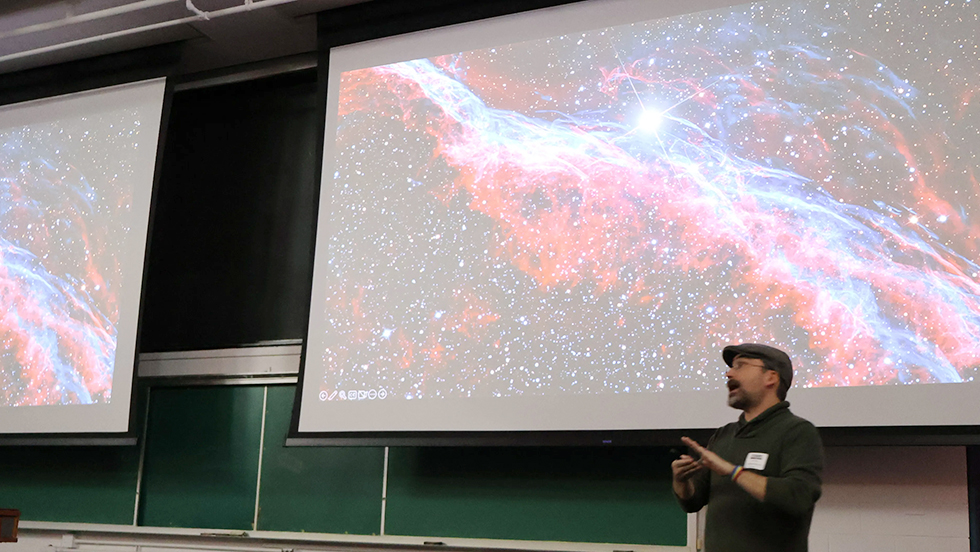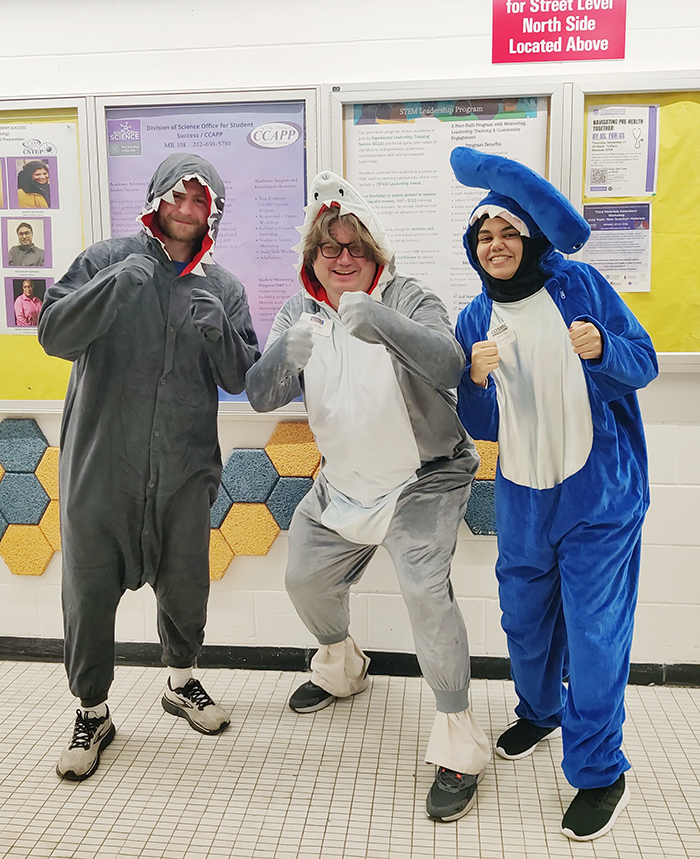
The brainchild of physics department chair Matthew Wright, PhD, the inaugural Cosmic Pathways conference explored the many directions a physics degree can take students.
To many, “physics” and “party” might seem like incompatible terms. However, Matthew Wright, PhD, associate professor and chair of the physics department at Adelphi, combined them for a new event aimed to engage students interested in the physical sciences. The event—the Cosmic Pathways conference—premiered this March, attracting 180 high school and college students for a day of presentations, workshops, career advice and fun at the City College of New York (CCNY) in Upper Manhattan.
“There is a precipitous drop in the number of high school students interested in physical science subjects like physics and engineering,” Dr. Wright said. “At the same time, I have [Adelphi] students who are in their junior year saying to me, ‘If I knew this is what physics was like, I would’ve chosen it as my major.’”
That’s when he realized he needed a way to better convey the exciting potential of a career in physics to students as early in their education as possible.
“Anywhere there’s innovation or something new being created, physicists are around it,” Dr. Wright said. “We’re an exciting group of people and I think if more students knew that, they would want to be involved.”
Over just six months, Dr. Wright collaborated with faculty from a number of colleges, universities and nearby Long Island high schools, as well as current Adelphi students, to bring this conference to fruition. It was launched with support from a two-part PhysTEC grant awarded by the Physics Teacher Education Coalition to address the shortage of physics teachers.
“There were people from so many different institutions who came together to make this work,” Dr. Wright said. “And there was just so much excitement and joy about this event.”
From black holes to superconductors

Matthew Wright, PhD (center), and former students Kyle Cash ’25 and Zahin Ritee ’25 dressed appropriately for the Be a Shark career workshop at the conference. Both students were part of Adelphi’s 3+2 joint program offering a BS in Physics from the University and a BS in Engineering from Columbia University.
Cosmic Pathways was a day packed full of panels and workshops with faculty members from Sarah Lawrence College, Manhattan College, the United States Military Academy and Adelphi. This included an “Ask an Expert!” panel and a visit to the CCNY planetarium. It was capped off with a keynote address from Rob Coyne, PhD, project communications director of the Nobel Prize-winning LIGO (Laser Interferometer Gravitational-Wave Observatory) team. He dug into how LIGO uses gravitational waves from black holes to “listen” to the universe.
Highlights of the conference included research presentations and poster sessions by high school and undergraduate students, sponsored by the Rochester Symposium for Physics Students.
“Student presentations are always a hit,” Dr. Wright said. “Any time we had high school and college students sharing their research and connecting with others, those events were wildly successful.”
For example, Edward Jansen, an Adelphi senior majoring in physics, presented research on machine learning prediction for high-temperature superconductors. Armina Yetimoglu of Lindenhurst High School explored the impact of wing design on fighter jet speed. And Adam Choudhry of St. John’s University shared his research on how wind turbines and solar panels can improve the environment.
At the Be a Shark career workshop, Dr. Wright and two Adelphi student volunteers donned shark costumes to inspire students to take control of their future careers.
“We basically give the students the secret sauce to success,” Dr. Wright said. “The idea is that you can’t be passive about [your career]. You have to make job opportunities happen through networking and being intentional about your career search.”
Opening new pathways for discovery
To commemorate this inaugural event, Dr. Wright is working on a paper of key takeaways, “Cosmic Pathways Conference: Exposure to Career Paths, Networking, and Physics Community for Early Stage STEM Students.” His co-authors will be the university leaders and Adelphi students who helped create and run the event.
Dr. Wright will also continue to reach high school students through his long-running Lab 4 Kids program, which brings Adelphi students to local high schools for a day of fun physics demos and experiments.
Meanwhile, he’s planning the 2026 Cosmic Pathways conference after this year’s successful launch. “The overall feedback was amazing,” he said. “Everybody wants us to do it again. So we’re starting to lay the foundations of that right now.”
Dr. Wright is already mulling over ideas for making next year’s event even more engaging for attendees. For example, he wants to create more opportunities for students to discover what interests them.
“Ultimately, that’s what this is about,” he said. “I’m not here to convince anyone to major in physics. We’re trying to give students space to discover new things they’d never thought about or seen before—then let them decide from there.”